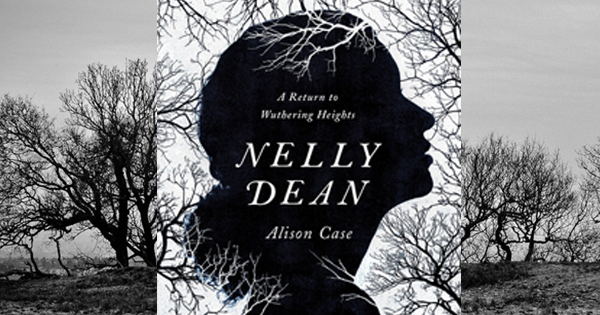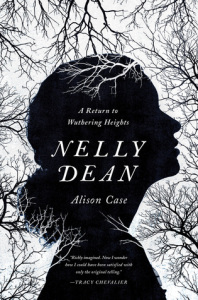The Wonder of Wuthering Heights
An interview with Alison Case, author of the novel “Nelly Dean”


In the past few years, a number of writers have turned to minor characters from classic tales—Longbourn by Jo Baker, March by Geraldine Brooks, even Wicked by Gregory Maguire, the basis for the Broadway musical. This is not a new phenomenon (Jean Rhys’s Wide Sargasso Sea, which revisits Jane Eyre, did it 50 years ago), nor is it limited to 19th-century novels—think of all the returns to Shakespeare, such as Jane Smiley’s A Thousand Acres or Tom Stoppard’s Rosencrantz and Guildenstern Are Dead, itself half a century old.
Alison Case, an English professor at Williams College, has just published Nelly Dean: A Return to Wuthering Heights. We asked her what draws writers back to these tales again and again.
Nelly Dean, as the subtitle implies, takes us back to the Wuthering Heights of Emily Brontë’s imagination, but from the housekeeper’s point of view. Why do you think writers return to these classic novels in their own work, decade after decade?
To some extent we’re drawn to do that with any narrative that comes to life for us, classic or contemporary. But with the best-loved classic novels, we have had generations to get to know them—they’re part of the fabric of our culture. At the same time, these stories are old enough that even with all that they often still feel strange and out of date in some ways. It takes a leap of imagination to re-enter them fully. That combination is quite fertile. It makes the work of engaging with them fictionally feel worth doing, important, but it also poses a huge challenge to do it well. That’s exciting for a writer.
Usually these modern books focus on minor characters who rarely speak in the originals—like Antoinette Cosway, Jean Rhys’s take on the madwoman in the attic. But in Wuthering Heights, Nelly Dean narrates a huge chunk of the novel, and in Nelly Dean, she’s our narrator from page one. Why did you focus on Nelly Dean and not, say, Zillah, another maid in the house?
Well, Zillah is awful, isn’t she? Who would want to spend time in her mind? But seriously, in teaching and writing about the novel, I found myself becoming more and more interested in Nelly. I was struck by how ready readers—like other characters in the novel—were to blame her whenever anything goes wrong, even though she often seems to be doing her best for people who, frankly, don’t treat her very well. There’s actually a whole strain of criticism that sees her as the villain of the story, which just seemed so unfair to me. After my daughter was born, it dawned on me how traumatic it must have been for Nelly to be forced to leave four-year-old Hareton, whom she has mothered since birth, alone with his crazy alcoholic father, so she can follow Cathy to Thrushcross Grange. It startled me that I had never noticed this before, and that neither had my students or, as far as I knew, other critics. From that point on, interest became obsession, and I realized I had to tell her story.
Why do you think readers are so willing to blame Nelly for what goes wrong in the novel?
It’s so hard to find a stable and enduring moral center in Wuthering Heights that there is a huge temptation to find a single figure of approval or disapproval. So you get what I call the Vindicate Heathcliff school of readings, the Blame Cathy school, and, of course, the Blame Nelly school. And there’s that handy moment in Wuthering Heights where she actually does blame herself for everything, so they jump on that as a confession of guilt. But I’ve also noticed a certain tendency for readers to have exaggerated expectations of loyalty and obedience from servants—to see any sign of independent thought or action as reprehensible insubordination. You’d think we would know better, but apparently not.
To your credit, there’s no enduring moral center in Nelly Dean, either. Hindley, for example—who is not pleasant in the original, to say the least—is much harder to villainize in your novel. What gave you the inspiration for that?
Hindley was my biggest challenge. I wanted to portray him as a tragic figure, rather than purely hateful. He is so unrelievedly ugly in Wuthering Heights, but it can’t have been easy for him, to be pushed out of his place by Heathcliff and treated so slightingly by his father. Then there’s that intriguing request for a fiddle at the beginning, which hints at a playful, maybe even creative, side to him that we never see again. There are also these hints that he and Nelly were close as children, as they must have been if they were nursed together by her mother. My hunch was that her early closeness with Hindley gives Nelly some understanding of Cathy and Heathcliff’s bond, but also makes her resentful, on Heathcliff’s behalf, for the ways Cathy sometimes seems to take his loyalty for granted.
Picking up Wuthering Heights or Jane Eyre today is very different from reading them in the 19th century—readers are arriving at these books with radically different backgrounds, both from the Brontës and each other. What stuck out to you in Wuthering Heights as a modern reader, and how did you approach these topics in your novel?
One thing that stuck out to me—in this and other novels, like Harriet Jacobs’s slave narrative Incidents in the Life of a Slave Girl or Tsitsi Dangarembga’s novel Nervous Conditions—is how women’s emotional labor, especially that of lower-class women, is appropriated and exploited. Feeling needed not just for physical work but for emotional care, and feeling competent to provide it, can become important to women’s sense of self-worth. That, ironically, can make it easier to exploit them. But I suspect Emily Brontë was more sensitive to this issue than her readers—that’s surely part of why Nelly is such a rich character in the original—so I don’t see Nelly Dean as a critique of her perspective in particular, but more of the way it’s often read. If my novel makes someone more interested in the emotional experience and working conditions of their child’s nanny or their parent’s home health care aid, I will be a happy woman.
One of my favorite parts of the novel is when Nelly’s mother tells her the story “The Heart’s Wish,” where a poor farmer courts the favor of a Brownie. It’s a gloomy fairy tale, and it ends badly, to say the least, but its themes echo later in the novel. What kind of role did fairy tales or the supernatural play in your approach to Nelly Dean?
A great deal of what happens in Wuthering Heights might conceivably have been things Nelly would wish for in advance, but that come true in ways she doesn’t at all anticipate—Mr. Earnshaw’s death, which brings Hindley home; Frances’s death, which frees him again; Heathcliff’s departure, which removes a source of conflict; Cathy’s departure for Thrushcross Grange, and so forth. I wanted that fear to be part of her character, as a kind of guilty offset to her desire to control things. Contemporary mainstream American culture places such a value on high ambition, on “having a dream,” no matter how seemingly unattainable, that it can be hard for us to wrap our minds around a cultural setting in which wanting too much is seen as both psychologically destructive and morally suspect. But that would certainly be the case for a woman of Nelly’s class and time, and folklore often serves as the vehicle for that kind of wisdom.

